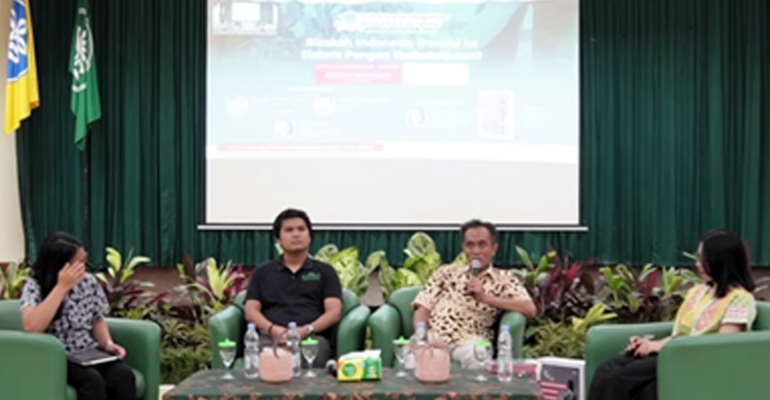To Make Indonesia’s Food System Safer, IPB University Professor: Needs Special Innovation and Land Aggregation

Prof Sobir, Professor at IPB University from the Department of Agronomy and Horticulture (AGH), Faculty of Agriculture (Faperta) provided input so that the food system in Indonesia could be safer and more sustainable.
According to him, the urgency of realizing a sustainable food and agricultural system is based on the need for survival. To make this happen, collective efforts are needed, unique Indonesian innovation, and aggregation in agricultural land management so that it can meet the needs of the community.
“The challenge faced in the agricultural sector is that food stocks, especially rice, are increasingly running low. Meanwhile in 2045, Indonesia’s population is estimated to reach 350 million people,” said Prof Sobir in the Center for Indonesian Policy Studies (CIPS) Talkshow Learning Hub Goes to Campus at the Toyib Hadiwijaya Auditorium, IPB Dramaga Campus.
The second challenge, he continued, is a decent standard of living and increasing public consumption. This is accompanied by the issue of food waste which has not been resolved.
“We cannot always rely on imports, because their availability on the global market is not necessarily sufficient. In addition, there is a possibility that rice production will decrease, while the number of farmers in Indonesia is decreasing,” he explained.
“We must secure supply first before prioritizing imports, the agricultural sector must be even stricter regarding this issue. If agricultural land can be expanded to the 60 million hectares of available land and made double the previous area, then our future food will be secure,” he added.
However, he said, there are still several things that need to be considered, such as farmers’ capacity in land management, collective and multi-sector efforts with the government, and the agricultural innovation ecosystem that still needs to be improved.
“We need technology that is unique to Indonesia, precision farming is still difficult to implement because it has to be adjusted according to the area of agricultural land and the Indonesian ecosystem which is different in each region,” said Prof Sobir.
According to him, currently agricultural technology already exists. However, he continued, the application still requires more costs. Its application is also only suitable in certain areas.
“In the future, our agriculture needs aggregation in land management so that it is more profitable in terms of productivity and production costs,” he said. (MW/Rz) (IAAS/HSY)



